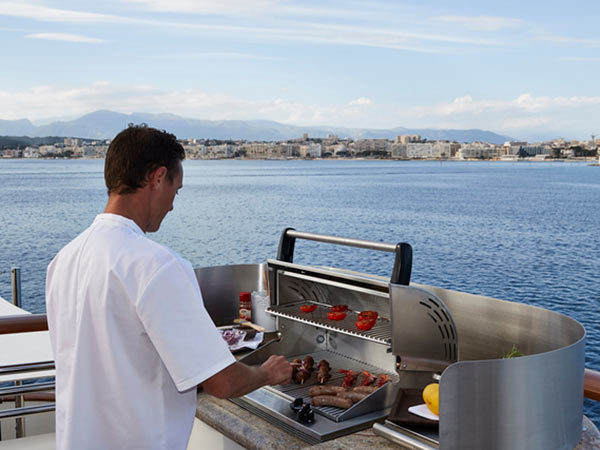Second Chef / Sous Chef job description

On larger yachts, you will often find a Second Cook/Sous Chef who works along side a Chef. This person will normally bear all responsibilities in cooking for the crew, side work for meal preparation, and assisting the Chef in any variety of ways. A new-to-industry individual who aspires to be a professional yacht chef will greatly benefit from holding an assistant position before jumping straight into a Chef position themselves.
Another common role on smaller yachts to find an individual who is sometimes referred to as a ‘Stew-Cook’ or a ‘Stew-Chef’. This is because the yacht is small enough to funnel responsibilities of both a cook and steward into one individual that handles both. On these smaller yachts, you may find that the requirements are much less formal than required on larger yachts. Some of these yachts have a more relaxed approach to dining where guests will gather to eat wholesome, healthy, well presented pool meals. On the flip-side however, you may find facilities for high-end cooking on small yachts and the owners may expect this.
If you hold a Stew-Cook position, you will be splitting your time between the galley and the interior of the yacht. Your duties will likely include cleaning, detailing, ironing and washing laundry in the afternoon and then cooking in the evening. Your tasks will vary, but it’s a great way to learn about several positions at once. To be successful in this position, you must be able to learn quickly and you must be adaptable to different working environments and conditions.
Required Skills and Experience
Most superyacht cooks have previous experience of working in a hotel or restaurant.
You must have excellent knowledge of food safety, storage, general health standards, and nutrition. A good cook should be flexible and able to perform gracefully under pressure! Your culinary repertoire should be good, to take into account the sometimes limited availability of produce and necessary menu changes due to unforeseen circumstances on board. You should have knowledge of fruits, dairy, meats, seafood and other products available only seasonally and perhaps limited by geographical region, as well as being able to cater to restricted diets, fad diets and food allergies.
The cook must also be very well organised and able to adhere to budgets and plan menus based on monetary restrictions.
In searching for a position that entails cooking to any degree, you must be clear in knowing what level of cooking is expected. If you are not formally trained and/or highly experienced, you must not present yourself as an expert Chef. In most cases, new-to industry cooks will take advantage of the Cook-Stew or the Second Cook/Sous Chef position and use it as their opportunity to learn the tricks of the trade. Cooking on a yacht is completely different than cooking for a hotel, restaurant or resort. You will learn worldwide provisioning, budgeting and cooking whilst at sea.
Many yachts require the cook to hold MCA STCW Basic Safety Certification
Required Certification
Although not mandatory, a recognised qualification such as a Level 3 Diploma in Professional Cookery (City and Guilds), Level 3 S/NVQ Professional Cookery (City and Guilds) or other industry-recognised international qualification would be beneficial. If not officially trained, restaurant and cook experience is a must.
Salary Range
The starting salary for a Cook or Stew-Cook on board a superyacht typically starts at between £1,500 to £2,500 per month. This could increase to between £2,000 and £3,000 per month for experienced candidates on larger yachts.
Career Progression
Superyacht Crew
A Second Cook or Sous Chef on board a superyacht could easily progress to Chef with experience.
Marine Industry
Career options for chefs in the wider maritime industry are mostly restricted to other crew jobs, for example the Merchant Navy or the holiday/charter companies.
Other Industries
The Hospitality, Hotel and Catering industries all need experienced chefs to work in a variety of environments.
